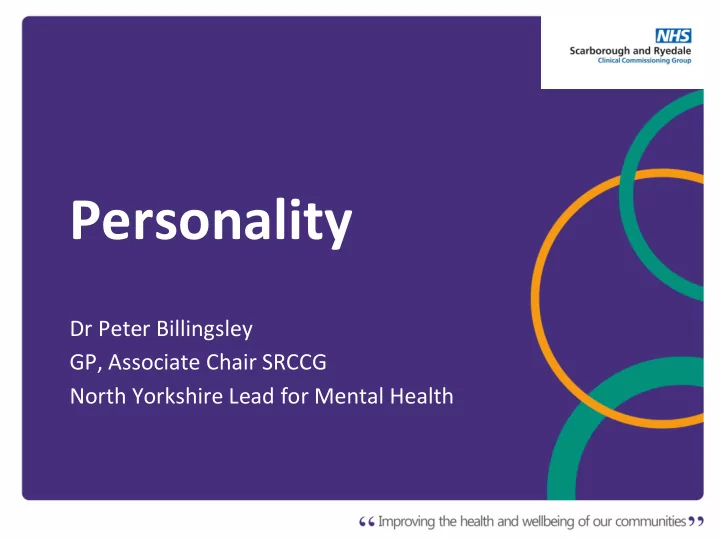

Personality Dr Peter Billingsley GP, Associate Chair SRCCG North Yorkshire Lead for Mental Health
Personality Type Myers-Briggs
INFJ
INFJ - Introverted iNtuitive Feeling Judging (Introverted Intuition with Extraverted Feeling) The Protector As an INFJ, your primary mode of living is focused internally, where you take things in primarily via intuition. Your secondary mode is external, where you deal with things according to how you feel about them, or how they fit with your personal value system.
ESTP
ESTP - Extraverted Sensing Thinking Perceiving (Extraverted Sensing with Introverted Thinking) The Doer As an ESTP, your primary mode of living is focused externally, where you take things in via your five senses in a literal, concrete fashion. Your secondary mode is internal, where you deal with things rationally and logically.
Personality Disorder Antisocial Personality Disorder Borderline Personality Disorder
Antisocial
Antisocial Personality Disorder What is it that they don’t feel and pass onto you?
1. Callous unconcern for the feelings of others 2. Gross and persistent attitude of irresponsibility and disregard for social norms, rules, and obligations 3. Incapacity to maintain enduring relationships, though having no difficulty in establishing them 4. Very low tolerance to frustration and a low threshold for discharge of aggression, including violence 5. Incapacity to experience guilt or to profit from experience, particularly punishment 6. Marked readiness to blame others or to offer plausible rationalizations person into conflict with society
Borderline Personality Disorder
EUPD What is it that they can’t cope with? And they pass onto you?
1.disturbances in and uncertainty about self-image, aims, and internal preferences 2.liability to become involved in intense and unstable relationships 3.excessive efforts to avoid abandonment 4.recurrent threats or acts of self-harm 5.chronic feelings of emptiness 6.demonstrates impulsive behaviour, e.g., speeding in a car or substance abuse
Recommend
More recommend